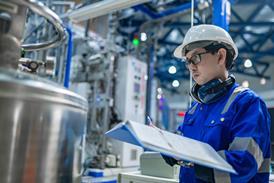The senior business leader and Managing Director of Tata Chemicals Europe brings a wealth of experience to the role. In his capacity as President, he will chair the CIA Board and the policy-deciding body of the CIA Council.
Martin has a proven track record of strategic leadership, having led the successful £93 million acquisition of British Salt in 2011 and the fundamental restructuring of the Northwich-based operations in 2014, which included the acquisition and investment in the 400MW combined heat and power (CHP) plant previously owned by EON.
Since then, Martin has devised and delivered a transformative programme of capital investment, particularly focusing on carbon reduction and high value-added products, including the UK’s largest EIGA grade Carbon Capture and Utilisation (CCU) plant commissioned in 2021. This facility captures over 40,000 tonnes per year of Carbon Dioxide, which is used to manufacture EP/USP grade sodium bicarbonate exported to over 60 countries in the world.
On taking office in January 2024, Martin Ashcroft FRSC, President of the CIA, said:
“I am looking forward to building on the outstanding leadership of Tom Crotty (CIA’s retiring President). Alongside Steve Elliott, the Association’s Chief Executive, Tom successfully steered us through Brexit, through the pandemic of Covid-19 and through ever increasing economic challenges. I will look to continue the great partnership he had with Steve to ensure chemical businesses across the UK are in as strong a position as possible to compete on the global stage and deliver growth for the sector”.
Steve Elliott, Chief Executive of the CIA, said:
“Martin is an outstanding leader in our industry with excellent commercial and governance experience and a real passion for manufacturing and its contribution to economic development and peoples’ lives. I know he will continue the work of Tom in doing all he can to secure a sustainable future for our sector. I am looking forward to working with him”.
The CIA looks forward to Martin’s leadership and strategic visions as he takes on the role of President. His experience and transformative initiatives position him well to contribute to the continued growth and development of the chemical industry in the UK.
ENDS
For any further information please contact Simon marshs@cia.org.uk.
NOTES TO EDITOR
- Businesses who make chemical products and solutions are integral to something like 96% of all manufactured goods. Whether it is ingredients for food and medicines; paints and coatings for cars and planes or materials for mobile phones and electric vehicle batteries, the chemical industry is truly the “industry of industries” – also playing a critical role in the nation’s response to Covid-19 through its supply of hand sanitiser, PPE and vaccine ingredients.
- Chemical businesses are located throughout the UK, with many of them clustered together in the North East of England, North West of England and Central Scotland. These factories and laboratories, operated by a highly trained and skilled workforce, make a significant contribution towards the UK’s productivity performance.
- Nearly 145 thousand people are employed in the sector and nearly half a million have roles that are dependent on the sector. Chemical workers typically earn around 25.4% more than other manufacturing industries and almost 37% more than the average worker.
- From Runcorn to the Humber Bank; from Teesside to Grangemouth, chemical businesses and their employees right across the country are essential to the Government’s levelling-up agenda.
- We are the country’s second biggest manufacturing exporters, sending goods to the value of more than £50 billion to other countries. The EU represents our most important market, but we continue to work closely with Government to inform and secure UK trade deals with other key chemical markets such as Japan and the USA.























